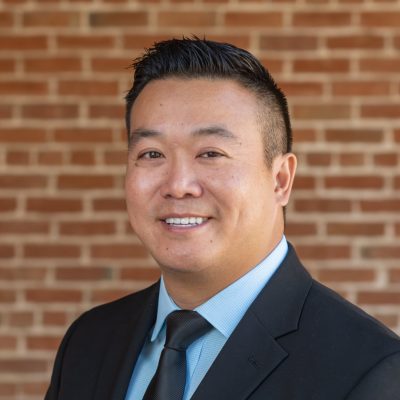30 The Land in Between
Dan Xayaphanh
I am a first generation Lao/Thai American who was born and raised in Iowa. At a young age I learned about the importance of my name, Danthai. My father said he named me Danthai because he wanted a name that was both American and Thai like I was. Later, in my college years during a family trip to my father’s hometown of Nakhon Phanom, Thailand, an elementary school teacher asked me my name. After I told him “Danthai,” he asked, “do you know what that means?” Not being able to speak Thai that well, I answered that I didn’t. With a big smile on his face, he said, “the land in between.” I did not realize the impact and relevance these two definitions of my name would make in my life as I searched for identity in two worlds where I was neither American nor Asian enough.
My family immigrated from Laos, a landlocked country in Southeast Asia that borders Vietnam and Thailand. Both my parents were college graduates working in an elementary school where they met, fell in love, married, and started their family. My mother was a teacher and my father was an administrator and life was good until the war crossed over to their village. During this insurgence, administrators were being targeted and killed, so my parents knew they had to escape. In the middle of the night, they left with their five children who were all under the age of seven. They made their way through the darkness, along with two other families to a small, thin boat meant for only four to six people to cross the Mekong River into Thailand. As the moon lit the way, my father recalls telling my older siblings to keep their heads down as they navigated past the dead bodies floating in the river. Once they reached the other side in Thailand, they were all captured and sent to prison, including my brothers and sisters. My mother chokes up as she remembers the taste and spiciness of the prison food and trying to feed that to her babies. Seeking asylum, our family was transferred to a Thai refugee camp where conditions were better compared to their village in Laos and the prison, but still a shell of life as people from across Southeast Asia sought to piece together what had just happened and what their new future held. As the world caught wind of what was happening in Southeast Asia, countries began to sponsor families and relocate them to start new lives in countries like France, Canada, and the U.S. Eventually, our family was selected to go to the U.S. Though I knew of my family’s history, my parents never really talked about it because of the trauma it caused.
My parents landed on American soil in October, 1978 as part of the “Boat People,” a wave of refugees trying to escape the continued violence and war-torn countries of Southeast Asia during the Vietnam War era. We were sponsored by a United Methodist Church in Northwest Iowa to live in a small farming community where cattle outnumbered people and diversity consisted of our family. I was born two years later as my parents struggled to navigate their new reality with six children in a world with a new culture, new language, and no family support system. Like other immigrants, my parents’ credentials and education did not transfer to the U.S., so they took jobs as custodians at the schools we attended in order to support our family.
Our lives consisted of two different worlds: the American life outside our house and our Lao and Thai culture whenever we walked through the doors of our house. My parents’ goal was to move on from our past life and to successfully launch their children forward by assimilating into the American way. There was never a blueprint for them to follow, but they just wanted us to have the “American Dream,” a dream that meant financial success, but which came at the cost of experiencing racism, separation from our heritage, and losing parts of our culture. What they did not know was that I needed that intrinsic cultural part of their past and would return to work in education to not only fill in my cultural gaps, but to help others process and fill in theirs as well.
It was not until I got to college that I began to process my intersectional identities as a first-generation Asian American and appreciate the cultural capital of blending my two worlds. College gave me the opportunity to take classes, meet others who looked like me and had the same experiences, and also work with faculty, staff, and mentors to process this with me. I learned about the lost histories that were never in our textbooks and I was given the freedom to voice my opinions, conduct research on the subject, and be proud of my culture. Our family stories need to belong in the fabric of education because they impact the way we learn.
From that point on, I never stopped seeking to learn about and infuse diversity, inclusion, and culture into education. My work has consisted of working with diversity & inclusion areas in cultural centers to, now, working with Cultural & Inclusive Experiential Learning Opportunities (CIELO), where we integrate travel, multicultural education, and service learning to provide cultural programming for all UA students. Through this work I am privileged to help college students just like myself process their life experiences and value each one of their intersectional identities. My life has come full circle and it was fate — beginning with the name given to me — that has led me to become the “land in between” as I navigate such experiences, not only for myself, but for others just like me.


